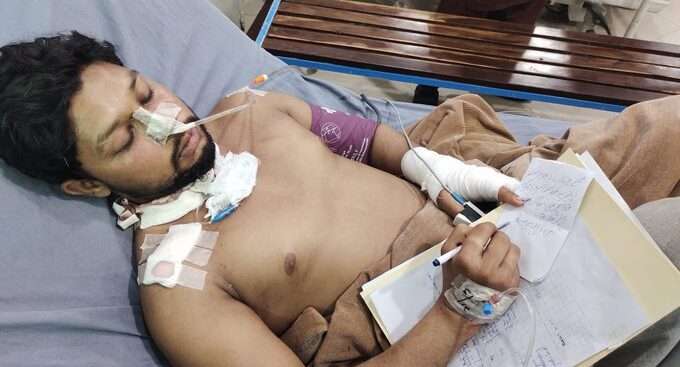Sheikhupura, Punjab — In a harrowing incident that has shaken the conscience of many, Waqas Masih, a 22-year-old Christian labourer, was viciously attacked at Subhan Allah Paper Mills in Chak No. 16, Sharaqpur — allegedly after enduring weeks of religious harassment and pressure to renounce his faith.
Waqas, the eldest of six children, comes from a humble family living in Bhatti Dhalwan. For months, he worked tirelessly in the cardboard packaging unit of the factory to help support his family. His father, Riyasat Masih, stood by his side — both father and son taking on laborious jobs at different mills to make ends meet. His mother, Bushra Riyasat, has spent nearly a decade working as a maid in a local school. Together, they held their heads high, quietly persevering through hardship.
But on Friday, March 21, their world was shattered.
At around 3:30 PM, while Riyasat had come to visit Waqas during his shift, a factory shift in-charge, Zohaib Iftikhar, allegedly called Waqas aside under false pretenses. According to Riyasat, Zohaib then cornered Waqas and bluntly asked if he had converted to Islam. When Waqas calmly stood his ground and affirmed his Christian faith, the situation turned sinister. Without warning, Zohaib reportedly pulled out a sharp cardboard-cutting blade and slashed Waqas’s throat, aiming at the jugular.
Riyasat, who stood just outside the room, witnessed his son collapse in a pool of blood. He watched in horror as Zohaib fled the scene, leaving behind a father screaming for help and a son fighting for his life.
This was no random act of rage. The attack, according to Waqas’s family, was cold-blooded and calculated. For over a month, Waqas had been subjected to verbal abuse, taunts, and relentless pressure to convert. As the only Christian worker in the factory, he had become an easy target. Just a day before the attack, a minor disagreement with Zohaib had escalated into accusations of blasphemy — a charge that, in Pakistan, can have devastating consequences. The family insists the allegation was baseless and malicious.
After the brutal attack, Waqas was rushed to Lahore’s Mayo Hospital in critical condition. For hours, his life hung in the balance. Though unable to speak, Waqas later regained some consciousness and, through sheer willpower, asked for a pen and paper. With trembling hands, he wrote about what had happened — how he was targeted, how the attacker pretended to be friendly, and how he tried to stop the bleeding by tying his shirt around his neck. He has no memory of how he made it to the hospital — a blur of pain and panic.
Today, he lies in a hospital bed, scarred not only by the deep wound across his neck but by the betrayal and hatred that nearly took his life.
The incident has sparked widespread outrage. The factory has cooperated with police, and an FIR has been registered at Sharaqpur Police Station. Zohaib has been arrested and is currently in custody pending investigation.
In a heart-wrenching appeal, Riyasat Masih said:
“This is not just an attack on my son — it is an attack on humanity. Waqas was punished for believing in his faith. No one should ever face death for their religion. I beg the authorities: give us justice. Protect our children. Protect the next Waqas.”
Nasir Saeed, Director of CLAAS-UK (Centre for Legal Aid, Assistance and Settlement), echoed the family’s plea, calling the attack:
“A horrific example of religious intolerance. It highlights a growing crisis in Pakistan — where blasphemy laws are weaponised, and religious minorities live in fear. We demand justice, accountability, and urgent reforms.”
Waqas’s family is now appealing to the government, human rights groups, and civil society for support — not just for medical care and legal help, but for a promise that no other child will be forced to bleed for simply being different.
This is not just Waqas’s story. It is a mirror reflecting a deeper, more painful truth — that in some corners of our world, faith can still be a reason to fear, to hide, or to suffer.
But through the silence and the sorrow, one voice remains steady — that of a young man who refused to betray his beliefs, even with a blade at his throat.
Let us not turn away.
